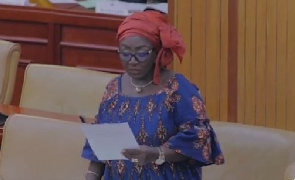The Member of Parliament for Ketu South, Abla Dzifa Gomashie, has bemoaned the stereotypical and wrong treatments that women who experience menopause have to endure in society.
She explained that while menopause is part of the biological growth of women, it is treated like some sort of canker, just as menstruation is.
Speaking on the floor of parliament, the Ketu South MP said that there is the need for society to demystify how it treats women experiencing menopause.
She further lamented that while there are some men who also experience menopause, they are not also treated the same way women are.
“Mr. Speaker, a lot of the shame around menopause is linked to negative attitudes towards women. As noted above, women in this bracket become vulnerable and are labelled unjustifiably for many wrongs in society. As a result, the cessation of menses may also be linked to other aspects of poor health. For instance, many women who actually have ovarian, cervical, or endometrial cancer put off getting treatment because postmenopausal vaginal bleeding is perceived in some cultures in Africa as a sign of witchcraft.
“Particularly, due to the lack of proper education on this natural phenomenon of women, women get labelled and categorised with descriptions that are heart-wrenching and punishments meted out to them. Mr. Speaker, it is interesting to note that, some men, also go through these biological changes which is referred to as ‘male menopause’ but known in medical terms as andropause. Parminder Singh (2013), in an article in the Indian Journal of Endocrinology and Metabolism under the topic Andropause: Current concepts, defined andropause as a syndrome associated with a decrease in sexual satisfaction or a decline in a feeling of general well-being with low levels of testosterone in older man.
“Mr. Speaker, what is interesting in this is that, our male counterparts hardly get subjected to the level of mockery and humiliation that women who experience menopause are subjected to. At least, not on the scale we see women taken. In addition, the process is not as debilitating in men because the implicated hormones in men affect a limited set of functions. On the other hand, in women, the implicated hormone, oestrogen contributes to the proper function of an unparalleled number of organs, hormones and physiological processes – all of which are affected during the menopause transition,” she said in her statement.
Dzifa Gomashie, who is also a former Deputy Minister of Tourism, Culture and Creative Arts, added that with all the things that come with menopause, the society does not also make the necessary provisions to support such women.
Using her own example as a case study, the MP said that she is proof that being menopausal does not mean inactivity, or the non-ability to perform.
“Mr. Speaker, aside public mockery and humiliation of menopausal women, women also endure such blame and humiliation on a daily basis, privately. Some concerns of women are brushed off and categorised as emanating from a person suffering from menopause for which attention should not be paid. As a result, society fails to make the necessary provision to support women during this stage of their lives. Mr. Speaker, along with menstruation, menopause has frequently been exploited as the punch in jokes and as a means of degrading and humiliating women.
“Mr. Speaker, my personal experience is, I was already menopausal when I was nominated, vetted and sworn in as a Deputy Minister for Tourism, Culture and Creative Arts by the visionary President John Dramani Mahama. Mr. Speaker, in that same bracket, I picked the forms for the primaries to contest in the Ketu South Constituency and won with 31 vote difference in 2019. In 2023, I won with a margin of 632 difference between the closest contender and I.
“My status as a woman in the ‘menopause zone’ has not affected my ability to perform my duties as a member of Parliament. However, science and literature on menopause have it that, the quality of life of women going through menopause, is affected. As such, while menopause is not an illness, and special attention can be given to those whose transition is associated with particularly unpleasant side effects, in the same way care is provided to people who have malaria, headaches, sinus infections etc., or those passing through pregnancy and lactation. Mr. Speaker I am a living example that women who are experiencing menopause can still be productive in our society and should therefore be supported to do more,” she added.
The Ketu South MP, Dzifa Gomashie further called for the eradication of stigma against menopause.
Read her full statement below:
STATEMENT BY THE HON. ABLA DZIFA GOMASHIE ON THE NEED TO ERADICATE STIGMA AGAINST MENOPAUSE
Mr. Speaker, I am humbled by the opportunity to present this statement on the phenomenon called menopause and the need to eradicate stigma associated with it.
Mr. Speaker, menopause is explained by the Centre for Integrated Healthcare as a natural biological process in a woman’s life when she has reached the permanent end of menstruation and fertility. In most instances a woman is said to be menopausal when she has not had her period for 12 months continuously.
Menopause is a transition that occurs over months and years. It is characterized by two stages, perimenopause and postmenopause. During this process a woman’s body is said to produce less of the hormones oestrogen and progesterone. Menopause and perimenopause symptoms can have huge impact on the life of a woman, including relationships and work.
Mr. Speaker, most frequently, the menopausal transition starts between ages 45 and 55 but recent studies also show that in Africa, women inter into menopause earlier. Indeed, women in their thirties can also be menopausal. It typically lasts up to seven years, although it can last up to fourteen years. The length and intensity of symptoms might vary depending on a variety of lifestyle and or hereditary factors, including smoking and the age it starts.
Mr. Speaker, as signs of menopause, a woman may experience Hot flashes (getting warm in the face, neck, or chest), night sweats, mood swings, irregular periods, decreased fertility, sleep disturbance, changes in metabolism, increased abdominal fat, thinning of bones and hair, among others. Many of these symptoms have further implications for the health of women, including increasing their risk of cardiac conditions.
Mr. Speaker, even though there are things one can do to help with symptoms including seeking medical help that can replace the missing hormones and help relieve the symptoms, the purpose of this statement would not allow me to dwell on them.
Mr. Speaker, in a paper by L.T. Wambua in 1997, published in the National Library of Medicine, under the heading African Perceptions and Myths about Menopause, it is contained that, depending on a woman's reproductive history and culture, menopause is viewed differently in Africa.
The paper notes that given the limited fertility control options available to women who have had many births, menopause is likely to be welcomed as the end of childbearing. Menopausal women in some African communities are eventually accorded the same status as men.
However, Mr. Speaker, the study presents that menopause frequently heralds the start of an emotional depressive time for childless women.
Mr. Speaker, a lot of the shame around menopause is linked to negative attitudes towards women. As noted above, women in this bracket become vulnerable and are labelled unjustifiably for many wrongs in society. As a result, the cessation of menses may also be linked to other aspects of poor health For instance, many women who actually have ovarian, cervical, or endometrial cancer put off getting treatment because postmenopausal vaginal bleeding is perceived in some cultures in Africa as a sign of witchcraft.
Particularly, due to the lack of proper education on this natural phenomenon of women, women get labelled and categorised with descriptions that are heart-wrenching and punishments meted out to them.
Mr. Speaker, it is interesting to note that, some men, also go through these biological changes which is referred to as ‘male menopause’ but known in medical terms as andropause. Parminder Singh (2013), in an article in the Indian Journal of Endocrinology and Metabolism under the topic Andropause: Current concepts, defined andropause as a syndrome associated with a decrease in sexual satisfaction or a decline in a feeling of general well-being with low levels of testosterone in older man.
Mr. Speaker, what is interesting in this is that, our male counterparts hardly get subjected to the level of mockery and humiliation that women who experience menopause are subjected to. At least, not on the scale we see women taken. In addition, the process is not as debilitating in men because the implicated hormones in men affect a limited set of functions. On the other hand, in women, the implicated hormone, oestrogen contributes to the proper function of an unparalleled number of organs, hormones and physiological processes – all of which are affected during the menopause transition.
Mr. Speaker, aside public mockery and humiliation of menopausal women, women also endure such blame and humiliation on a daily basis, privately. Some concerns of women are brushed off and categorised as emanating from a person suffering from menopause for which attention should not be paid. As a result, society fails to make the necessary provision to support women during this stage of their lives.
Mr. Speaker, along with menstruation, menopause has frequently been exploited as the punch in jokes and as a means of degrading and humiliating women. Although some people may find hormonal fluctuations amusing, these are typical physiological changes that most women go through. Unfortunately, they can have unpleasant side effects on women who are known to be the bearers of and those who rock the cradle of our very existence. Typically, these changes come at the time when women are undertaking roles that are critical to their societies – caring for the elderly, running small and corporate businesses and providing much required mentorship to the next generation.
Mr. Speaker, a woman’s biological changes, especially those that come by age, should not be regarded as the fault of women. As a result, we need to sensitize our societies out of these. Our societies must be able to coexist and encourage women through these challenges. Additionally, what women need, in appreciation for their roles in their productive years, is empathy and care.
The world cannot be championing the Sixteen SDG'S, especially goals 1 (No Poverty), 2( Zero Hunger), 3 (Good Health), 5(Gender Equality) and 8 (Decent work and Economic Growth) and still be comfortable with using menopause as an excuse to deny women the dignity these goals seek to give.
Mr. Speaker, my personal experience is, I was already menopausal when I was nominated, vetted and sworn in as a Deputy Minister for Tourism, Culture and Creative Arts by the visionary President John Dramani Mahama. Mr. Speaker, in that same bracket, I picked the forms for the primaries to contest in the Ketu South Constituency and won with 31 vote difference in 2019. In 2023, I won with a margin of 632 difference between the closest contender and I.
My status as a woman in the "menopause zone" has not affected my ability to perform my duties as a member of Parliament. However, science and literature on menopause have it that, the quality of life of women going through menopause, is affected. As such, while menopause is not an illness, and special attention can be given to those whose transition is associated with particularly unpleasant side effects, in the same way care is provided to people who have malaria, headaches, sinus infections etc., or those passing through pregnancy and lactation.
Mr. Speaker I am a living example that women who are experiencing menopause can still be productive in our society and should therefore be supported to do more.
In some countries, there are incentives for the women in this stage of life to make them comfortable and equipped to travel on this journey with dignity and pride. In private sector, companies which are taking such steps are gaining the competitive edge.
Having Hot flashes, losing one's hair, getting the feeling of pins and needles under one's feet are not what determines one's status as a witch nor is it a sign of mental illness. A woman ceasing menstruation means she has earned her stripes as a mature woman. It is a sign that she has walked the ropes. It shows that she has arrived at a beautiful stage in her life where she must be respected and supported to continue to make her contribution to society.
Thank you, Mr. Speaker, for the opportunity to remove the veil from the misconceptions and the "hush hush" surrounding menopause.
AE
General News of Friday, 4 August 2023
Source: www.ghanaweb.com
Menopausal women are labelled unjustifiably for many wrongs in society – Dzifa Gomashie laments
Entertainment
















